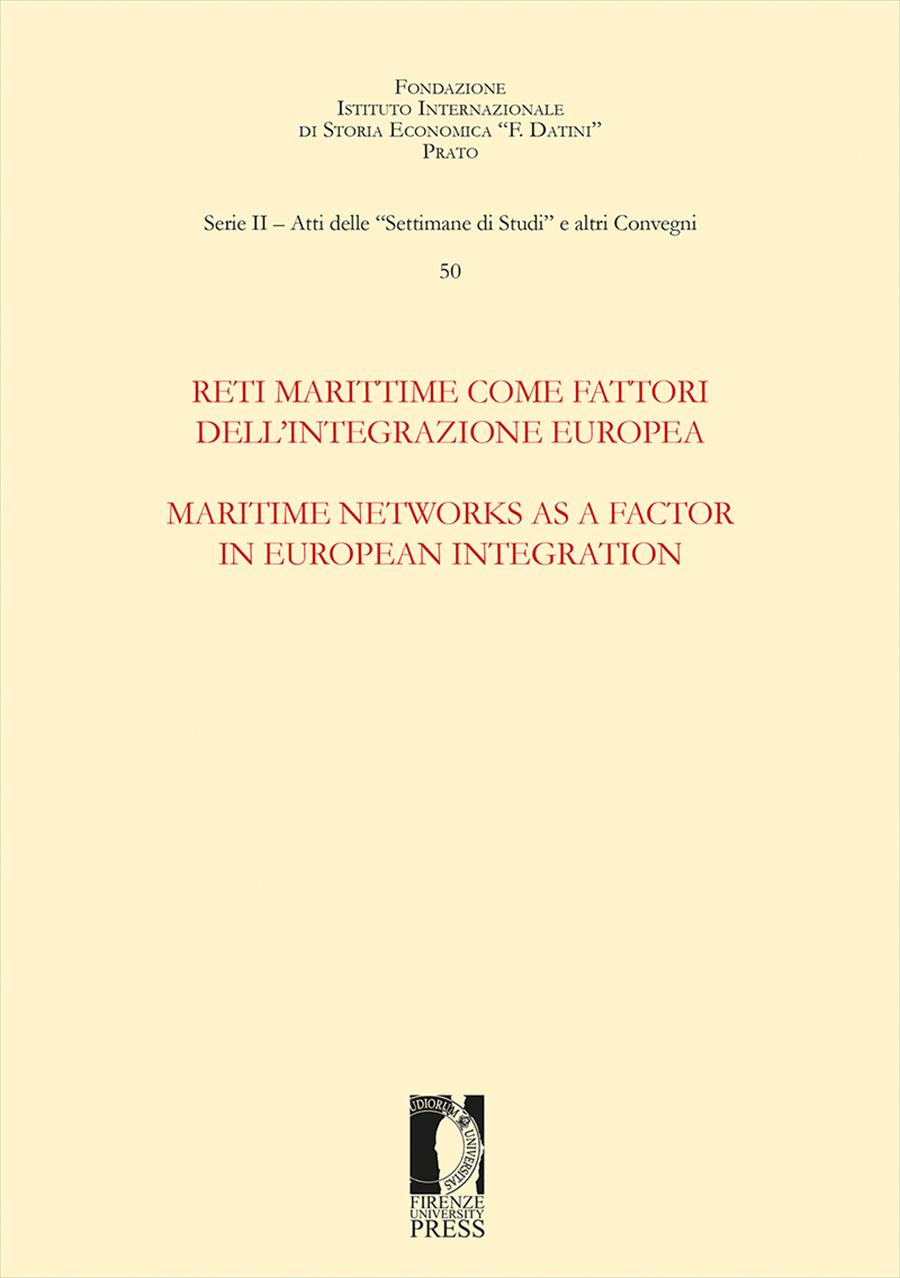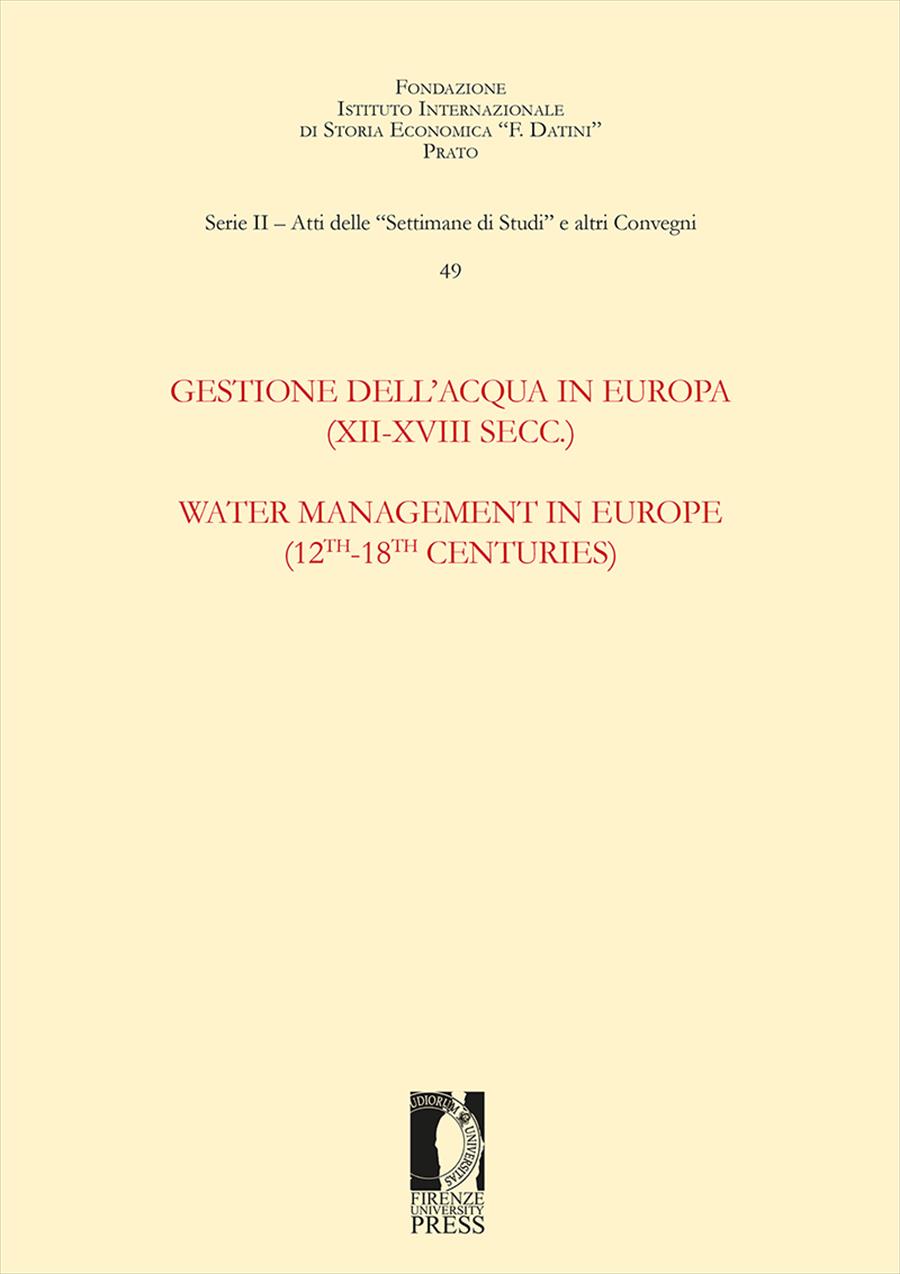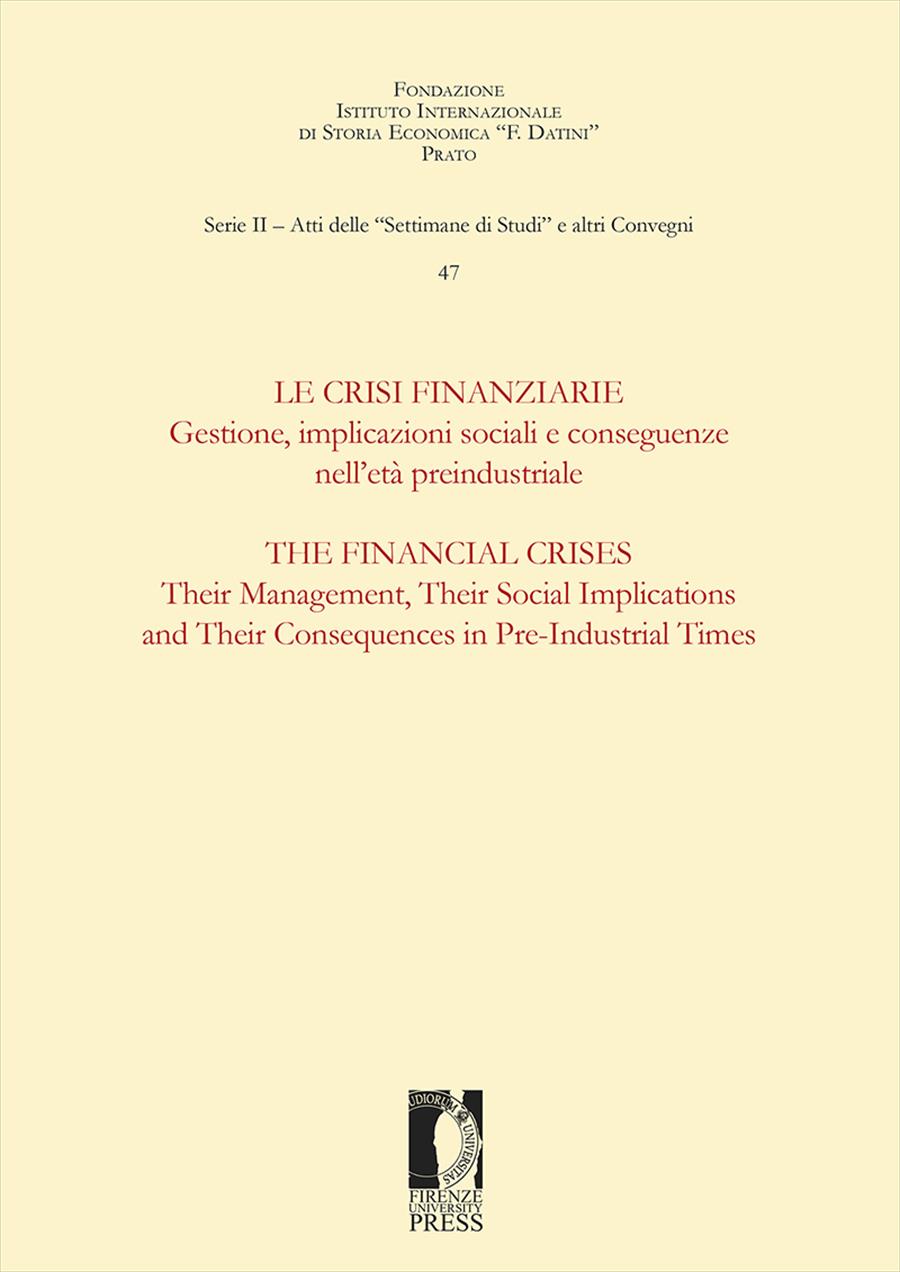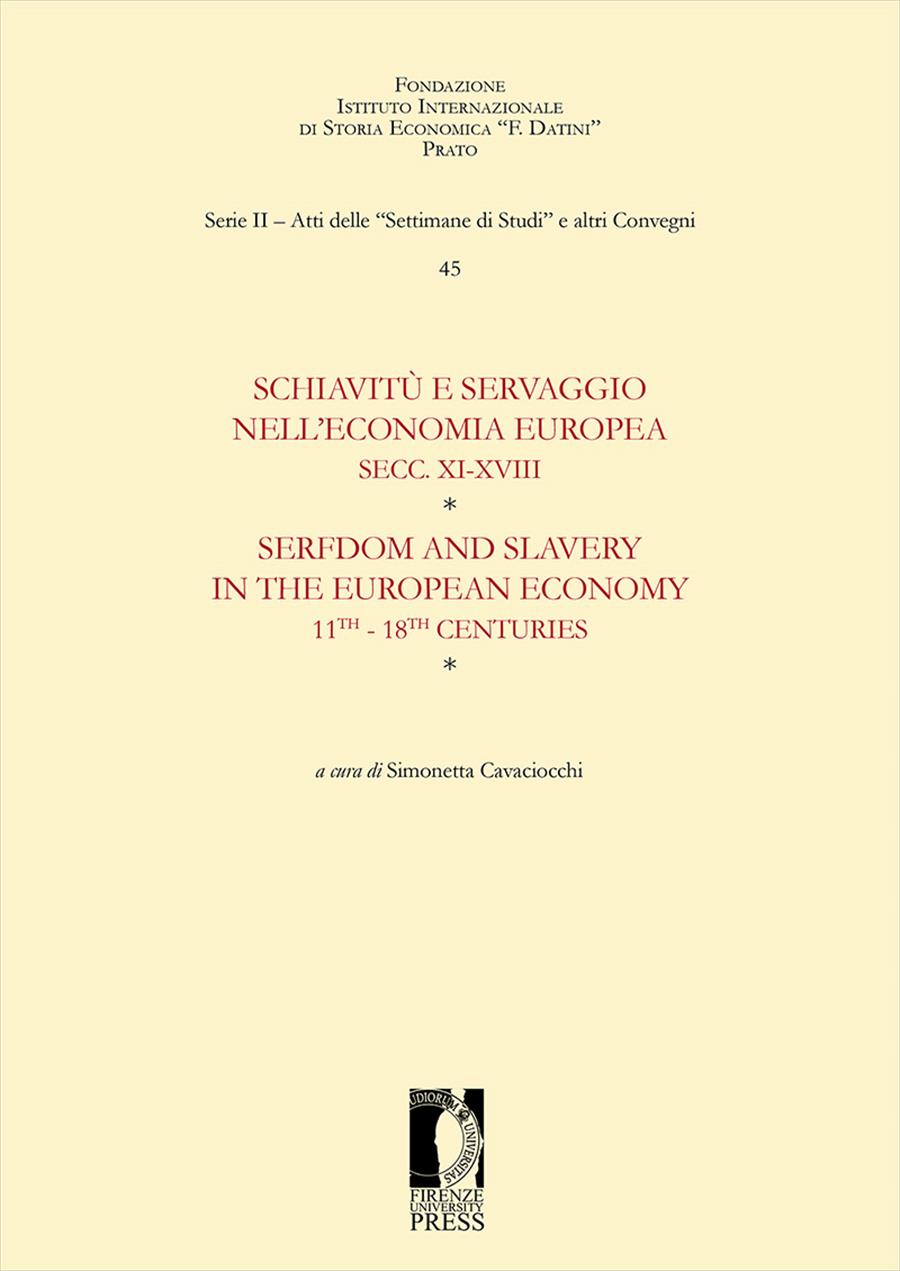Reti marittime come fattori dell’integrazione europea / Maritime Networks as a Factor in European Integration
- Edited by:
- Giampiero Nigro,
This wide-ranging theme takes Braudel’s concept of the “Mediterranean” as its starting point. Braudel’s vision of an enclosed sea as a geographical opportunity for economic integration between nations with different religions, languages and ethnicities and political bodies still functions as a model for studies on a wide range of contexts. The goal of the 50th Study Week was to go beyond the study of individual systems in isolation, and to combine instead different analysis of open and enclosed seas or coastal areas in order to understand the integration role played by maritime connections in Europe. Since in pre-industrial civilizations water transport was easier than land transport, the time has come to bring attention to the way these relationship networks operated both on a European level and with Asian and North African trade partners. This volume starts from the great research traditions which have, however, rarely been integrated on a larger and continental scale, and analyses them on either a regional or thematic basis. Immanuel Wallerstein has developed Braudel’s concept by conceptualising its intercultural and transnational dimensions and its role in the system of labour. He called it a "world system", not because it involves the whole world, but because it is larger than any legally defined political unit. And it is a "world economy" because the base link between the different parts of the system has an economic nature. The various regional research aspects and traditions have been linked together in a coherent approach which aims at evaluating: - What geographical, nautical, technical, economic, legal, social and cultural elements influenced the emergence of the various regional networks, and how these worked; - The nature and role of seaports as nodal points of sea routes and of their hinterland through rivers, canals and roads; - The commercial and personal ties between merchants and shipowners in various ports; - How regional networks connected with each other and how, over time, they ended up integrating into larger units; - How private networks, initially between merchant and seafarer organizations, ended up dealing with local authorities and, after their growth, with states and empires in order to protect their interests.
- Keywords:
- Mediterranean,
- maritime networks,
- Middle Ages,
- modern age,
- Europe,
- maritime trade,
- DOI: 10.36253/978-88-6453-856-3
- Series: Atti delle «Settimane di Studi» e altri Convegni
- Scientific Board: Fondazione Istituto Internazionale di Storia Economica «F. Datini»
- Language: Italian, English
- Subjects: Economic History
University of Florence, Italy - ORCID: 0000-0002-1008-1153
In che modo le rotte di navigazione sono servite come elemento di connessione? / How did shipping routes serve as a connecting force?
Luciano Palermo
Il sistema degli scambi nel Mediterraneo occidentale tra XIV e XV secolo e il porto di Roma- CC BY 4.0 |
- © Author(s)
-

pp.29-47
Angela Orlandi
Between the Mediterranean and the North Sea: Networks of Men and Ports (14th-15th Centuries)- CC BY 4.0 |
- © Author(s)
-

pp.49-69
David Igual Luis
Movimento portuale, reti marittime e diversità dei mercati a Valenza nel XV secolo- CC BY 4.0 |
- © Author(s)
-

pp.71-87
Wendy R. Childs
England’s Maritime and Commercial Networks in the Late Middle Ages- CC BY 4.0 |
- © Author(s)
-

pp.89-115
Nenad Fejic
Extension, ramification, temporalité et dangerosité d’un grand réseau, situant Raguse (Dubrovnik) au point nodal des échanges entre la Péninsule Ibérique et l’Orient méditerranéen (XIII-XV siècle)- CC BY 4.0 |
- © Author(s)
-

pp.117-134
Renard Gluzman, Gerassimon Pagratis
Tracking Venice’s Maritime Traffic in the First Age of Globalization: A Geospatial Analysis- CC BY 4.0 |
- © Author(s)
-

pp.135-153
Pierrick Pourchasse
Les réseaux négociants européens et les échanges entre la France et l'Europe du Nord (XVIIe-XIXe siècles)- CC BY 4.0 |
- © Author(s)
-

pp.155-181
Jari Ojala
Maritime Information Networks between Northern and Southern Europe during the Eighteenth century- CC BY 4.0 |
- © Author(s)
-

pp.183-194
In che modo i punti nodali hanno messo in relazione sfere commerciali diverse? / How did nodal points bring together different commercial spheres?
Louis Sicking
Funduq, Fondaco, Feitoria. The Portuguese Contribution to the Globalisation of an Institution of Overseas Trade- CC BY 4.0 |
- © Author(s)
-

pp.197-207
Werner Scheltjens
The Dutch Republic as Example of Maritime Transport Services Clusters in Preindustrial Europe (ca. 1650-1800)- CC BY 4.0 |
- © Author(s)
-

pp.209-227
Maria Ryabova
Venetian Trading Firm of the Soranzo Brothers (1406-1434) and Its Commercial Network- CC BY 4.0 |
- © Author(s)
-

pp.229-253
Benedetto Ligorio
Un ponte tra ottomani e cristiani. Il network degli ebrei di Ragusa tra Balcani e Adriatico (1585-1635)- CC BY 4.0 |
- © Author(s)
-

pp.255-280
Luisa Piccinno, Andrea Zanini
Genoa: Colonizing and Colonized City? The Port City as a Pole of Attraction for Foreign Merchants (16th-18th centuries)- CC BY 4.0 |
- © Author(s)
-

pp.281-296
Francis Brumont
Deux ports semblables, mais que tout oppose: Bordeaux et Rouen au XVIe siècle- CC BY 4.0 |
- © Author(s)
-

pp.297-315
Manuel F. Fernández Chaves, Rafael M. Pérez García
Textiles Market in 16th-Century Seville: Business and Mercantile Groups- CC BY 4.0 |
- © Author(s)
-

pp.317-338
Joana Sequeira, Flávio Miranda
‘A Port of Two Seas.’ Lisbon and European Maritime Networks in the Fifteenth Century- CC BY 4.0 |
- © Author(s)
-

pp.339-353
In che misura il libero scambio e il protezionismo facilitarono l’integrazione di reti marittime? / To what extent did free trade and protection facilitate the integration of maritime networks?
Gelina Harlaftis
Black Sea and its Maritime Networks, 1770s-1820s. The Beginnings of Its European Integratio- CC BY 4.0 |
- © Author(s)
-

pp.355-382
Justyna Wubs-Mrozewicz
Maritime Networks and Premodern Conflict Management on Multiple Levels. The Example of Danzig and the Giese Family- CC BY 4.0 |
- © Author(s)
-

pp.385-405
Guillaume Calafat
Un réseau corse entre l’Afrique du Nord et l’Europe. Commerce maritime, institutions et enrichissement au tournant des XVIe et XVIIe siècles- CC BY 4.0 |
- © Author(s)
-

pp.407-427
Quali caratteristiche dello scambio culturale o di prodotti particolari sono serviti a integrare le reti marittime? / Which features of cultural exchange served to integrate maritime networks or were their particular products?
Richard W. Unger
Markets and Merchants: Commercial and Cultural Integration in Northwest Europe, 1300-1700- CC BY 4.0 |
- © Author(s)
-

pp.431-452
Leos Müller
Swedish Trade and Shipping in the Mediterranean in the 18th Century- CC BY 4.0 |
- © Author(s)
-

pp.453-469
Scambi intercontinentali / Intercontinental exchanges
Stefania Montemezzo
Ships and Trade: The Role of Public Navigation in Renaissance Venice- CC BY 4.0 |
- © Author(s)
-

pp.473-484
Renato Ghezzi
North Italian Ports and the Levant in the 16th and 17th Centuries- CC BY 4.0 |
- © Author(s)
-

pp.485-505
Helmut Rizzolli, Federico Pigozzo
Economic and Social Aspects of the Trade of Luxury Goods between Africa and Europe: Ostrich Feather- CC BY 4.0 |
- © Author(s)
-

pp.507-517
Paolo Calcagno
Attraverso la porta di Lisbona: i generi coloniali volano del commercio luso-genovese tra XVII e XVIII secolo- CC BY 4.0 |
- © Author(s)
-

pp.519-532
Luca Lo Basso
Traffici globali. Corallo, diamanti e tele di cotone negli affari commerciali dei Genovesi in Oriente- CC BY 4.0 |
- © Author(s)
-

pp.533-554
- Publication Year: 2019
- Pages: 592
- eISBN: 978-88-6453-857-0
- Content License: CC BY 4.0
- © 2019 Author(s)
- Publication Year: 2019
- Pages: 592
- ISBN: 978-88-6453-856-3
- Content License: CC BY 4.0
- © 2019 Author(s)
Bibliographic Information
Book Title
Reti marittime come fattori dell’integrazione europea / Maritime Networks as a Factor in European Integration
Editors
Giampiero Nigro
Peer Reviewed
Number of Pages
592
Publication Year
2019
Copyright Information
© 2019 Author(s)
Content License
Metadata License
Publisher Name
Firenze University Press
DOI
10.36253/978-88-6453-856-3
ISBN Print
978-88-6453-856-3
eISBN (pdf)
978-88-6453-857-0
eISBN (xml)
978-88-9273-037-3
Series Title
Atti delle «Settimane di Studi» e altri Convegni
Series ISSN
2704-6354
Series E-ISSN
2704-5668





